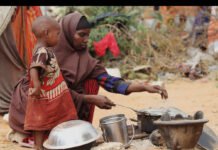Monday, June 30, 2025 — HAN
Source: Independent.co.ug

A panel discussion was held at the land governance forum on Friday, June 27. Stakeholders reviewed existing policies and made new suggestions to ensure that land governance priorities, including women’s agricultural land ownership, are integrated into Uganda’s National Development Plan IV (NDP IV).
Kampala, Uganda — THE INDEPENDENT & AGENCIES | Agriculture officials have been reminded that securing women’s land rights is essential for building resilient food systems and addressing food insecurity across the East African region.
“Women with secure land rights are more likely to adopt climate-smart agriculture, diversify income, and educate their children. Therefore, enhancing women’s access to and ownership of agricultural land is not a charity; it is a strategic investment in Uganda’s present and future,” said Judith Nabakooba, Uganda Minister of Lands, who represented Prime Minister Robinah Nabbanja at the 2nd Parliamentary Symposium on Land Governance held Friday at Parliament Hall.
The symposium had various presentations that provided a vital platform to advance discussions on women’s land rights, strengthen land governance, and promote sustainable, climate-resilient agricultural landscapes for food security.
“Govt has invested in land registration systems and community sensitization programs, but gaps remain in implementation and cultural transformation. As leaders, institutions, and citizens, we must dismantle invisible barriers denying women their rightful stake in the land they till,” said Minister Nabakooba.
The symposium was organized by the Uganda Parliamentarian Land Management Forum (UPLMF) in partnership with several government and civil society stakeholders, plus regional partners like the Intergovernmental Authority on Development (IGAD) in Eastern Africa. Other stakeholders who attended the forum were the Ministry of Lands, Housing, and Urban Development; Parliament; the Ministry of Agriculture, Animal Industry, and Fisheries; the Ministry of Energy and Mineral Development; Oxfam; KCCA; the Uganda Land Alliance; the National Planning Authority; FRA Uganda; Habitat for Humanity; and Cordaid.
Oxfam Uganda Country Director Francis Odokorach called for laws to be put in place to make it easier for women to get full rights over land to improve productivity.
“Up to 70% of the workforce in the agricultural sector are women, but only a small fraction of them own land. Such disparities undermine agricultural productivity,” Odokorach told the stakeholders.
“Securing women’s land rights is not just about property—it is about power, dignity, and the future of our communities. Let’s create a just and fair land tenure for women and minority groups.”
The outcomes of Friday’s meeting are expected to inform parliamentary actions, guide policy development, and contribute to the broader goals of the Food Systems Resilience Program (FSRP) — ensuring that women’s land rights are no longer an afterthought but a central pillar of sustainable development.

Lands Minister Nabakooba (above) represented PM Nabbanja and later handed the Intergovernmental Authority on Development (IGAD) in Eastern Africa officials (below) a certificate. The certificate, awarded to stakeholders at the symposium, was presented in acknowledgment of IGAD’s continued commitment to strengthening land governance, promoting women’s land rights, and supporting resilient food systems in Uganda and across the region.

Representing IGAD at the symposium, Innocent Ndahiriwe, Uganda National Coordinator for Migration and Forced Displacement, speaking on behalf of Joselyn Bigirwa, IGAD Head of Mission to Uganda, reaffirmed IGAD’s commitment to advancing gender equality in land governance.
“Women form a significant portion of the agricultural workforce in the IGAD region, yet their access to land remains disproportionately low. Bridging this gap is not just a matter of fairness—it is a prerequisite for food security, economic growth, and climate resilience,” Innocent Ndahiriwe said.
IGAD’s support for this symposium aligns with both Pillar Four of the FSRP, which focuses on embedding food systems resilience into national and regional policymaking, and the implementation of the IGAD Regional Food and Nutrition Security Strategy (2025–2034), endorsed by agriculture ministers in Djibouti in December 2024.
“This symposium is more than a dialogue—it is a clarion call to integrate gender-responsive land policies at the heart of food security and climate resilience strategies. IGAD stands with Uganda’s Parliament and the region in advancing policies that empower women as key agents of change in agriculture and land governance,” Ndahiriwe emphasized.
Building on the inaugural 2024 symposium, which emphasized the critical role of land tenure security in promoting climate resilience and food security, this year’s symposium shifts the focus to women’s land rights, under the theme “Securing Women’s Agricultural Land Ownership: A Political and Development Imperative.”
The symposium is part of IGAD’s ongoing efforts under the Food Systems Resilience Program (FSRP), a seven-year initiative funded by the World Bank, aimed at strengthening food security and resilience across Eastern and Southern Africa. Pillar Two of the program emphasizes the sustainable management of natural resources—including land—as critical to building resilient agricultural landscapes.
The statistics are stark. Studies in Kenya reveal an 8% gender gap in agricultural productivity, while other assessments show gaps ranging between 43% and 72% across various contexts in the region. Much of this is driven by women’s limited land ownership and decision-making power over agricultural resources.
The symposium convened members of parliament, government officials, development partners, and civil society, all united around one objective: setting clear land governance priorities that political leaders must uphold in future policies and electoral commitments. Central to this is the recognition and protection of women’s land rights, especially for agricultural purposes.

MP Rachael Magoola speaks at the forum as UPLGF chairperson MP Christine Kaaya Nakimwero looks on at the symposium





